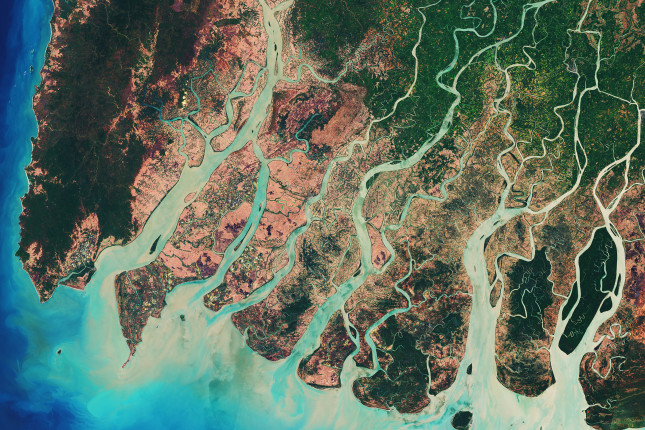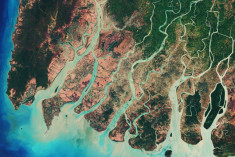-
To Reduce Future Conflicts over Water, Reconceptualize “Shared Waters”
 In the years ahead, climate change and the proliferation of new technologies and information availability will require us to reshape our vision of shared waters. Because these megatrends are experienced in concert, the opportunities, challenges, and uncertainties for shared water management will continue to compound over time.
In the years ahead, climate change and the proliferation of new technologies and information availability will require us to reshape our vision of shared waters. Because these megatrends are experienced in concert, the opportunities, challenges, and uncertainties for shared water management will continue to compound over time.While it is impossible to know precisely how shared water will look in the future, we should already be working to expand how we conceptualize shared waters, address inequities embedded within water management, and develop criteria and processes that successfully identify and include non-traditional shared water actors in decision-making. These shifts will strengthen our ability to generate creative and sustainable management strategies and help us avoid water-related conflicts.

In the years ahead, climate change and the proliferation of new technologies and information availability will require us to reshape our vision of shared waters. Because these megatrends are experienced in concert, the opportunities, challenges, and uncertainties for shared water management will continue to compound over time.
While it is impossible to know precisely how shared water will look in the future, we should already be working to expand how we conceptualize shared waters, address inequities embedded within water management, and develop criteria and processes that successfully identify and include non-traditional shared water actors in decision-making. These shifts will strengthen our ability to generate creative and sustainable management strategies and help us avoid water-related conflicts.
Reconceptualize Shared Waters
Current definitions of shared water tend to be limited to a watershed or groundwater aquifer that is intersected by an international or subnational boundary. But water is a resource that crosses more than just political boundaries. By recognizing this with a more flexible and inclusive definition of “shared water,” we can increase water security. For example, states that import water-intensive products such as grains could potentially offset their local water demand, allowing them to more readily meet other water needs. However, this virtual water exchange is currently obscured by more traditional trade considerations. By integrating a robust analysis of economic inter-basin water transfer we gain a more precise measurement of water availability that can be used to recognize opportunities to reduce conflict and increase water security.
Address Power Imbalances
Though the benefits of viewing water as a flexible resource are many, unless adequately addressed, the inequities built into existing social and political systems may be embedded into future shared water management initiatives. Such imbalances might exist at the international level between countries with differing financial or political power, or at the subnational level between communities, households, and individuals. It needs to be understood that though the world is increasing its economic capacity as a whole, disparities in the economic capacity between states or even individual water users can result in unsustainable allocations. Prioritizing one state or water user at the expense of another will ultimately undermine the long-term security of an entire shared water system. High income countries should not be excluded from the imperative to promote positive change.
Broaden What Defines a Shared Water Actor
The inherent connection between shared waters and other sectors will increase the number of actors that influence shared water management. Civil society organizations, multinational institutions such as the United Nations, and even corporations will become increasingly involved in management decisions. This could potentially steer water management away from approaches used unilaterally by water resource experts towards a more inclusive management approach within the greater sociopolitical environment. While participation of relevant actors in shared water management creates a sense of shared ownership and investment, which in turn can spark creative conflict management, there is also the potential for corporate, military, or other dominant interests to be prioritized over those of local communities or organizations.
It is important to note that change is not a new phenomenon in shared waters. However, the magnitude and distribution of change today – which includes but is not limited to environmental change (including climate change impacts), population growth, and economic development – is placing unprecedented pressure on surface and groundwater quantity and quality.
To avoid future conflicts over water, we need to better understand how the drivers of subnational conflict, such as poverty and inequality, impact shared water issues. Diffuse forms of conflict are not yet adequately understood, and will need to be considered as we strive to create increasingly adaptive management systems. While technologies will undoubtedly help in the creation of such systems, they may do so with an exclusively Western, technocratic perspective that could introduce unintended consequences. Without the inclusion of diverse perspectives in decision making, local dynamics and concerns may be delegitimized. The shift to adaptive management is necessary for addressing the uncertainty ahead, and we must begin to prepare our institutions and rethink our approaches today.
Aaron T. Wolf, PhD, is a professor of geography in the College of Earth, Ocean, and Atmospheric Sciences at Oregon State University. His research and teaching focus is on the interaction between water science and water policy, particularly as related to conflict prevention and transformation. A trained mediator/ facilitator, he directs the Program in Water Conflict Management and Transformation, through which he has offered workshops, facilitations, and mediation in basins throughout the world. He is the author, most recently, of The Spirit of Dialogue: Lessons from Faith Traditions in Transforming Conflict.
Mckenney Coffey recently obtained her Bachelor’s degree in Environmental Science and Policy from the University of California, Irvine. She is a former intern with the Environmental Change & Security Program and is the assistant editor for the “Uncharted Territory” series.
This piece draws from McCracken, Melissa, Laura E. R. Peters and Aaron T. Wolf. “Megatrends in Shared Waters in 2030 and Beyond.” In Asit K. Biswas, Cecilia Tortajada, and Philippe Rohner, eds. Assessing Global Water Megatrends. New York: Springer, 2018.
Photo Credit: Photo via Shutterstock. All rights reserved.
Sources: Transboundary Freshwater Dispute Database, New Security Beat
 A Publication of the Stimson Center.
A Publication of the Stimson Center.

 In the years ahead, climate change and the proliferation of new technologies and information availability will require us to reshape our vision of
In the years ahead, climate change and the proliferation of new technologies and information availability will require us to reshape our vision of 

